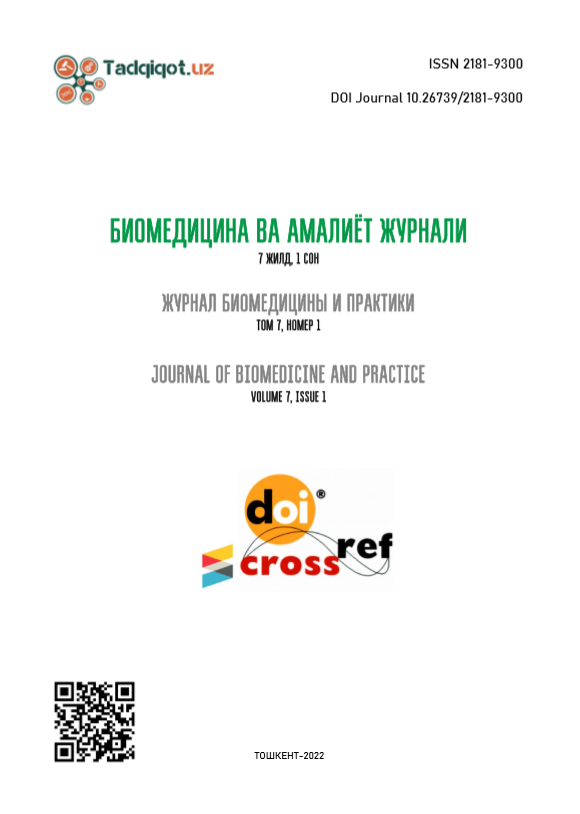NUTRITON SUPPORT FOR TRAUMATIC BRAIN INJURY
Keywords:
nutritional support, traumatic brain injury, protein-energy malnutritionAbstract
Objective: to evaluate the impact of nutritional and metabolic support based on the study of the development of hypermetabolism-hypercatabolism syndrome in patients with closed traumatic brain injury.
Methods: The results of the examination and complex treatment of 92 patients with CTBI of various etiologies, who were treated in the neurosurgical intensive care unit of the Republican Center for Emergency Medical Care in Tashkent from 2016 to 2020, became the materials for analysis and discussion. Various options for parenteral and enteral nutrition were studied, and the effectiveness of the use in addition to the standard nutritional support of pharmaconutrients.
Results: The work carried out made it possible to establish that the metabolic response to injury already on the first day is manifested by an increase in energy needs, an increase in negative nitrogen balance, hypoproteinemia, hypotransferinemia, dyslipidemia; additional enteral administration of glutamine to patients with CTBI leads to the restoration of the functions of the gastrointestinal tract 2–3 days earlier compared to the control group of patients; The proposed complex program for the treatment of patients with CTBI with additional enteral use of pharmaconutrients and a hypercaloric enteral mixture containing dietary fiber contributed to a more rapid relief of the hypermetabolism-hypercatabolism syndrome, elimination of energy deficiency, restoration of protein metabolism, restoration of the functions of the gastrointestinal tract with a general improvement in treatment results and a decrease in mortality by 5.3 ± 0.7%.
Conclusions. Our results confirm the clinical efficacy of NP, supplemented by enteral administration of pharmaconutrients in the early post-traumatic period, with a further transition to a hypercaloric mixture containing pharmaconutrients and dietary fiber, improves the results of treatment of patients with CTBI, and reduces the length of stay in the ICU.
References
Badjatia, N., and Vespa, P. (2014) Participants of the international multidisciplinary consensus conference on multimodality M. Monitoring nutrition and glucose in acute brain injury. Neurocrit. Care 21 (Suppl. 2), S159-S167.doi:10.1007/s12028-014-0036-2
Cederholm T., Bosaeus I., Barazzoni R., Bauer J., Van Gossum A., Klek S., et al. Diagnostic criteria for malnutrition - an ESPEN consensus statement. Clin. Nutr. 2015; 34: 335-40. 18.
Kai Jia, Xin Tong, Fang Liang. Effect of sequential nutritional support on nutritional status and expression of regulatory T lymphocyte in patients with early severe traumatic brain injury. Neuropsychiatric Diseast and Treatment 2018: 14 1561-1567
Kurtz P and Rocha EEM (2020) Nutrition Therapy, Glucose Control, and Brain Metabolism in Traumatic Brain Injury: A Multimodal Monitoring Approach. Front. Neurosci. 14:190. doi: 10.3389/fnins.2020.00190
Kofler M., Schiefecker A.J., Beer R. Et al. Enteral nutrition increases interstitial brain glucose levels in poor-grade subarachnoid hemorrhage patients. J. Cereb. Blood Flow Metab. 2017;
Kreymann K.G., DeLegge M.N., Luft G., de Heer G. A nutrition strategy with special consideration for the reference of protein. Clin.Nutr. 2016;11: 55-60.
Pedro Kurtz and E.M. Rocha. Nutrition Therapy, Glucose Control, and Brain Metabolism in Traumatic Brain Injury: A Multimodal Monitoring Approach. Frontiers in Neuroscience. March 2020, Volume 14, Article 190.
Licheng Gao, Min Zhang, Xiaojun Zhou.The effect of early enteral nutrition combined with anti-infection intervention on gut bacteria translocation-related infections in patients with severe traumatic brain injury. Int J Clin Exp Med 2020;13(7):5130-5137 www.ijcem.com/ ISSN:1940-5901/IJCEM0110079
McClave, S. A., Taylor, B. E., Martindale, R. G., Warren, M. M., Johnson, D. R., Braunschweig, C., et al. (2016). Guidelines for the provision and assessment of nutrition support therapy in the adult critically Ill patient: society of critical care medicine (SCCM) and American Society for Parenteral and Enteral Nutrition (A.S.P.E.N.). JPEN J. Parenter Enteral. Nutr. 40, 159–211. doi: 10.1177/0148607115621863
Singer, P., Blaser, A. R., Berger, M. M., Alhazzani, W., Calder, P. C., Casaer, M. P., et al. (2019). ESPEN guideline on clinical nutrition in the intensive care unit. Clin. Nutr. 38, 48–79. doi: 10.1016/j.clnu.2018.08.037
Oldani, M. Glutamine Supplementation in Intensive Care Patients: А Meta-Analysis of Randomized Clinical Trials/ M. Oldani, M. Sandini, L. Nespoli [et al.]// Medicine (Baltimore). – 2015.- Vol. 94(31). – P.1319

